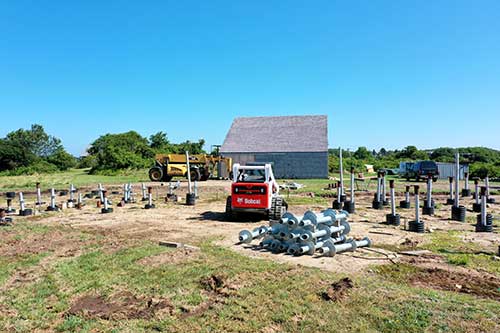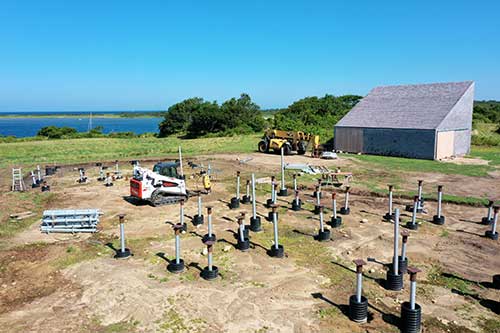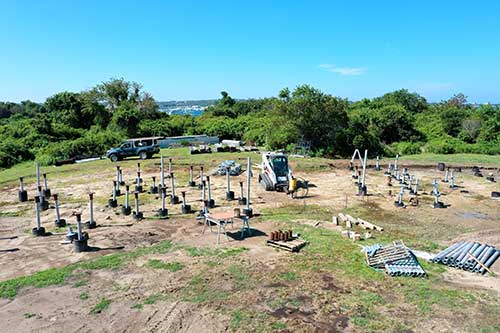Native American Burial Site Preserved Through Innovative Engineering
In a world where the old and new often clash, a story of innovation, respect, and collaboration emerges from Block Island, off the coast of Rhode Island. Here, one of the largest Narragansett Native American burial sites coexists with modern advancements, exemplifying how construction professionals, architects, and engineers can play a vital part in preserving our cultural heritage while moving forward with development.
This story centers around the construction of two Mass Timber Frame homes, showcasing Atlas Systems of New England's commitment to ethical and innovative construction practices.
The Challenge: Respecting the Past while Building for the Future
The project posed an unusual challenge from the start. The site chosen for the new homes was not just any land; it was a sacred space, home to the final resting places of members of the indigenous Narragansett tribe.
The importance of respecting this burial site meant that traditional construction methods were off the table. Excavation, the usual first step in construction, was impossible without risking desecration of the burial site. Scott Heinz of the Heinz Group knew this project required a specialized approach and reached out to Atlas Systems of New England for a solution.
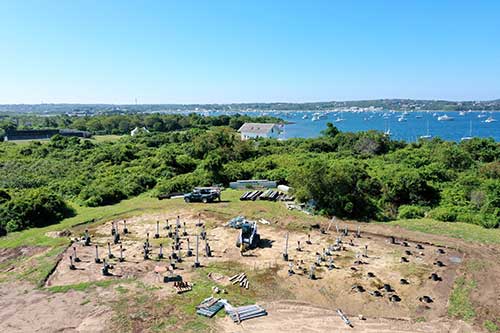
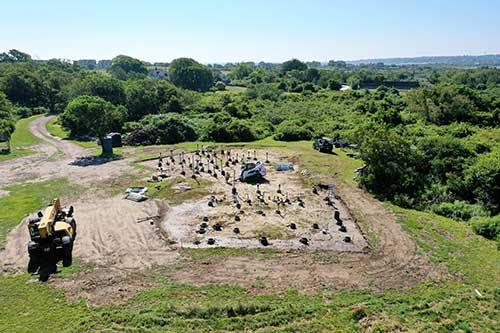
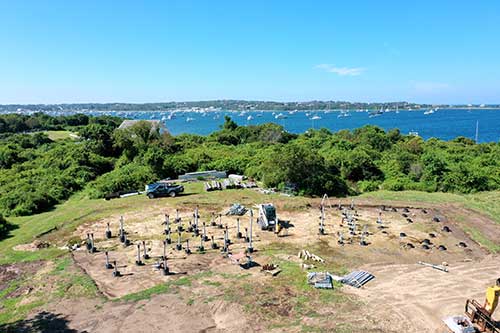
The Solution: Helical Piers and Ground Penetrating Radar
Atlas Systems, known for their innovative foundation solutions in New England, proposed using helical piers to support the new structures. This method would provide the necessary support without disturbing the soil's sanctity. Collaboration with the Rhode Island Archaeology Department ensured that no artifacts or remnants would be harmed in the process. Using ground-penetrating radar, the team could identify and avoid critical areas, marking safe zones for the installation of helical piers.
This precise planning led to the decision to use sixty-nine 4-1/2” helical piers with a helical configuration of 10-12-14 inches, ensuring the structural integrity of the homes on Block Island's sandy soil. Earth Contact Products (ECP) provided the necessary materials, reinforcing the partnership between Atlas Systems of New England and ECP in tackling challenging projects.
Overcoming Obstacles
The logistical challenges of working on an island only accessible by ferry added a layer of complexity to the project. The Atlas Systems team navigated these obstacles with determination, from transporting heavy equipment across the sea to overcoming mechanical failures on-site. When their drive-head snapped after the 9th pier installation, ECP responded quickly, ensuring minimal downtime by delivering a new drive-head overnight. The team's ability to install 30 helical piers in a single day after receiving the replacement equipment speaks to their expertise and efficiency.
However, machinery breakdowns weren't the only hurdles faced. When a historic hotel and restaurant on the island caught fire, resulting in a temporary shutdown of access to the island, the Atlas Systems team regrouped and adjusted their plans, showcasing their resilience and commitment to the project.
A Testament to Collaboration and Innovation
The successful installation of all sixty-nine helical piers is a testament to the power of cooperation among construction professionals, suppliers like ECP, and regulatory bodies. It highlights the possibility of integrating modern building techniques with the utmost respect for historical and cultural sites.
This project on Block Island stands as a shining example for developers and construction professionals worldwide. It demonstrates that with the right team, innovative solutions, and a commitment to ethical practices, it is possible to honor our past while building for the future.
Atlas Systems of New England has once again pushed the boundaries of what is possible in the construction industry. Their dedication to finding solutions that respect the integrity of cultural heritage sites while implementing cutting-edge building techniques is commendable. This project not only preserved a significant piece of Native American history but also set a new standard for responsible development in environmentally and culturally sensitive areas.
Looking Ahead
As our society continues to grow and develop, it is crucial that we remember the importance of preserving our cultural heritage. Projects like the one on Block Island serve as valuable lessons in the possibilities of modern construction technology and traditional values working hand in hand. For more stories of innovation, dedication, and collaboration, follow Atlas Systems of New England’s blog. Together, we can build a future that honors our past.
For inquiries and more information about helical pier installation and other innovative foundation solutions, reach out to Atlas Systems of New England and Earth Contact Products, where advanced technology meets respect for history.
